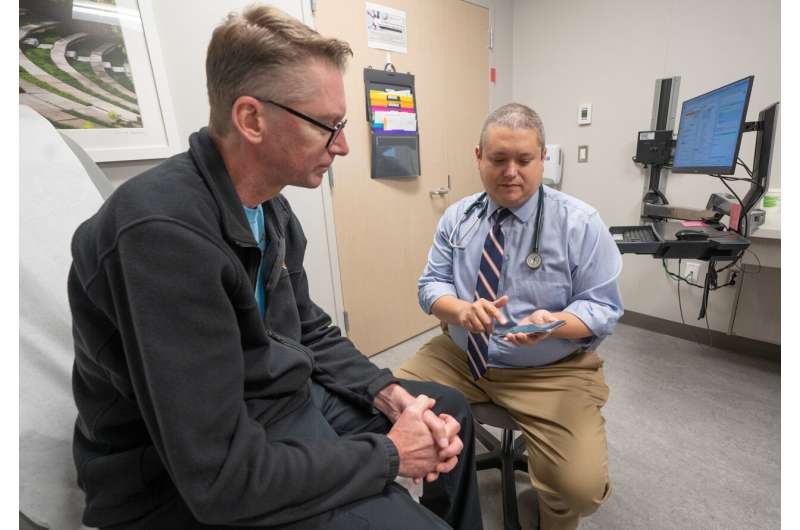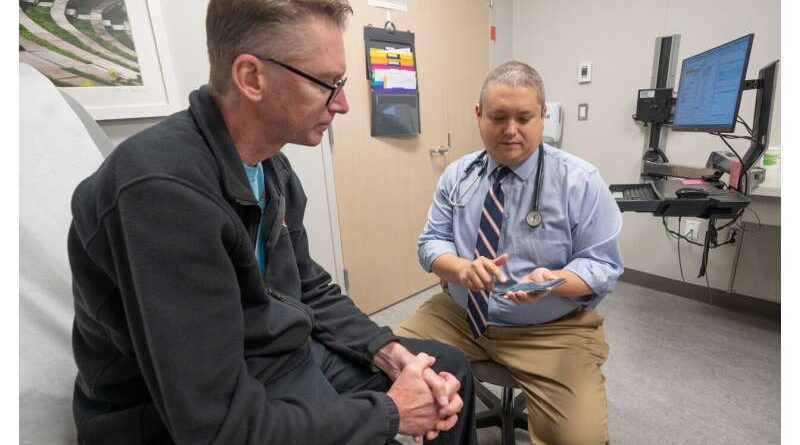Survey: Most Americans are comfortable with AI in health care

Harrison Jackson, MD, describes a common listening device he uses in his patient visits at Ohio State University Wexner Medical Center. The app uses artificial intelligence to record data and organize it into actionable medical information, saving healthcare providers time and allowing them to focus on patients. Credit: Ohio State University Wexner Medical Center
Artificial Intelligence (AI) is all around us – from smart home devices to entertainment and social media algorithms. But is AI right for healthcare? A new national survey commissioned by the Ohio State University Wexner Medical Center finds that most Americans believe it is, with a few reservations.
A national poll of 1,006 people found:
To address some of these issues, Ohio State Wexner Medical Center is evaluating the use of the Microsoft Dragon Ambient eXperience (DAX) Copilot. It uses interactive, ambient and predictive AI to securely listen to the patient’s visit and record medical information in the patient’s electronic medical record. Instead of the provider typing notes during the visit, they can focus on the patient and review and organize the notes later.
Ravi Tripathi, MD, chief health information officer at Ohio State Wexner Medical Center, led the pilot program. From mid-January to mid-March of this year, 24 physicians and advanced practice providers in primary care, cardiology and obstetrics and gynecology tested the technology during outpatient clinic visits to patients.
After obtaining the patient’s consent, the provider records the visit through the AI application. Once a visit is complete, the data is compiled and ready for review in less than a minute.
“We found it saved up to four minutes per visit. That’s time the doctor can use to connect with the patient, do the education and make sure they understand the plan going forward,” Tripathi said.
“A few doctors liked their old job but, in general, 80% finished the pilot. In fact, we allowed them to continue using the AI solution after that because it had a significant impact on their behavior during the eight weeks of testing.”
One of the pilot participants was Harrison Jackson, MD, an internist who has been frustrated by the typing that must be done during each patient visit.
“Documentation is necessary, but it takes away from the quality of the patient interaction during the visit. I even apologized. I said, ‘I’m sorry, I know I’m looking at the computer more than you,’ ” Jackson said.
After reviewing the AI documents, Jackson reports occasional errors such as incorrect pronouns or mistaking one word for another—all of which he said were easily corrected during his chart review. He supports the further use of AI in healthcare.
“I spend as much, if not more, time with each patient, and it’s quality time with eye contact. I often talk about parts of the physical exam out loud for of the AI program to win, and it makes for a better conversation with my patient,” said Jackson. “I’ve also allowed our residents to use technology under my supervision, and we’ve noticed the quality of their interactions with patients and the quality of the projects they produce have improved.”
While the majority of Americans also see the importance of AI for healthcare, the survey found more than half (56%) are still slightly alarmed and 70% have concerns about privacy data.
“I know patients are concerned about the privacy and security of their data, but we hold artificial intelligence and this technology to the same standards that we hold our electronic medical record,” said Tripathi.
As of July 1, Ohio State expanded access to documents to all outpatient providers. In the first two weeks of extended use, 100 nurses regained 64 hours of time and improved satisfaction scores from patients who said their conversations with their doctors were very important. .
This study was conducted on behalf of The Ohio State University Comprehensive Cancer Center by SSRS on its Opinion Panel Omnibus platform. The SSRS Opinion Panel Omnibus is a national, bimonthly, probability-based survey. Data collection was conducted from 17-20 May 2024, among a sample of 1,006 respondents.
The survey was conducted online (n=974) and telephone (n=32) and was administered in English. The margin of error for the total respondents is +/- 3.5 percentage points at the 95% confidence level. All data in the SSRS Opinion Panel Omnibus is averaged to represent the population of US adults age 18 or older.
Provided by Ohio State University Medical Center
Excerpt: Survey: Most Americans comfortable with AI in healthcare (2024, August 21) Retrieved 21 August 2024 from https://medicalxpress.com/news/2024-08-survey-americans-comfortable-ai- health.html
This document is subject to copyright. Except for any legitimate activity for the purpose of private study or research, no part may be reproduced without written permission. Content is provided for informational purposes only.
#Survey #Americans #comfortable #health #care
